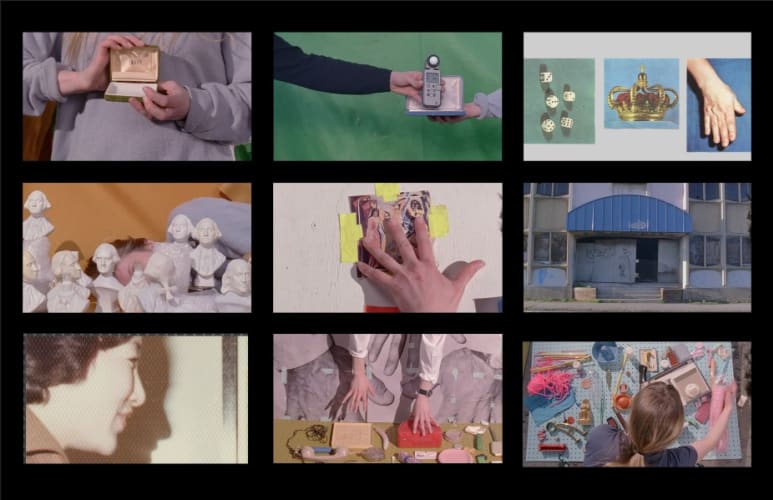Video/Film
16 mm film on video with sound, dimensions variable, 6 min. 28 sec.
For Basel Statements 2016, Foxy Production presents Soft Film, a new film by Sara Cwynar. Projected on video, it combines elements of her composite photography and her publications within the traditions of the experimental essay film and performance video. Cwynar is interested in how objects circulate via the Internet, in the lives they have now that they could not have lived before. In the film, the artist collects, arranges, and archives her eBay purchases of dated objects according to a logic based upon color, material, vintage, and use.
In contrast to her photographic work, the artist is the central protagonist of her film. We see her working in her studio, both arranging objects and breaking them down. She also performs simple actions to camera - moving behind a potted plant, grasping a jewelry box - that recall the early video art of Vito Acconci and John Baldessari. Like them, she implicates herself in the taping process, as both subject and object of the camera.
The film's voice-over combines Cwynar’s own writing with quotes from anthropology and image theory. The artist has written:
The text and video grapple with questions of how discarded contemporary objects circulate in economies other than the ones they were intended for, how I find them, and what they mean to me. I want to think about the affect of thrown away objects and use them to open up to other questions about the lives of images over time, about cycles of capitalism, and about feminism. At the heart of the project is a set of questions: why would anyone care about a discarded thing? Why should you care and why do I? And what other systems of power are all these things caught up in?
A central motif of the film is the out-moded velveteen jewelry box. Now traded on eBay as a collectible object, its original role was as packaging that signaled glamour, fashionability, and high value. The film links the softness of the box's velveteen texture to the concept of "soft misogyny", or more commonly "soft sexism,” which refers to subtle forms of discrimination.
There are sections of the film that move laterally into apparently unrelated areas but that then circle back to its major themes. In one part, Cwynar analyses a series of abandoned photographs from the 1970s of business people in South Korea meeting an African official. The artist is interested in the different ways the subjects are positioned within the photographs and, in particular, in the fleeting image of the only woman present.
The film brings together the different strands of the artist’s practice of archiving objects and images. She builds a multi-layered thesis that looks not just to the history of design and production, but also to how the political realm we inhabit dates, fades, and changes. She considers the notion of a post-feminist landscape, and how it can make both the sexism and counter-sexism of earlier decades appear dated, even kitsch. Yet the kernel of truth that Cwynar points to is that progress and reaction are still very powerful forces; they may just be upholstered now in "softer" material.
